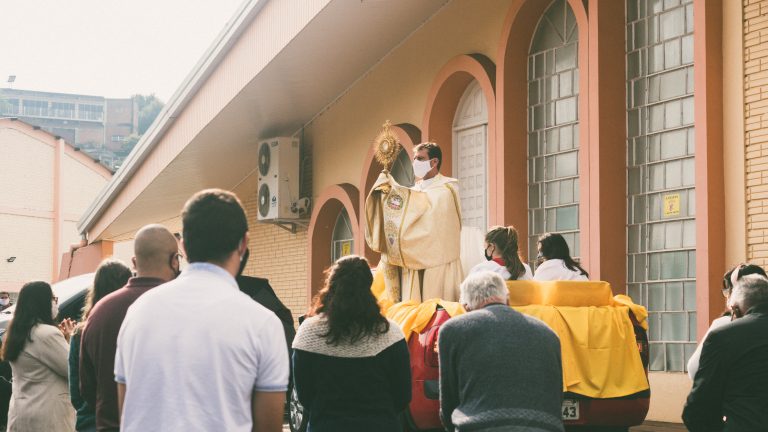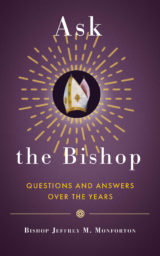By Bishop Jeffrey Monforton
Bishop Jeffrey M. Monforton is the bishop of Steubenville, Ohio. He is the former rector of Sacred Heart Major Seminary in Detroit. Ask the Bishop began as an initiative in Bishop Monforton’s diocesan newspaper, where children of all ages could write in questions about the faith and receive a response from the Bishop.

Many people wonder why they have to go to Church every Sunday when so many Catholics and non-Catholics have decided not to. Let’s set aside the question of whether we are currently able to attend and instead look to the future, for when we are again able to freely worship with no restrictions. Why should Catholics go back to Mass?
Attending Mass every Sunday (or Saturday evening) is actually one of the Five Precepts of the Church. What is a precept? A precept is a general rule or command. For our purposes here, the precept enables us to grow in the love of God and neighbor. The First Precept of the Church is: “You shall attend Mass on Sundays and Holy Days of Obligation and rest from servile labor.”
What we do when we attend Mass every Sunday is sanctify that holy day with our own lives as we continue to grow as Christians.
Here is a good question: What in our lives could be more important than receiving the Body and Blood of Christ each week? Recall how, for many of us who participated in team sports or band, we had to practice before the next game or concert. Well, by going to Mass every week, we become better Christians and most certainly have a better understanding of Jesus’ “game plan” for each and every one of us, as well as for the human family. As in sports, if you continue to miss practice, you become less and less an effective member of the team. While Mass is much more than practice, I hope you get the point.
Let’s compare and contrast for a moment. In 1955, the Church was much more part of people’s daily lives, from Sunday Mass attendance to parish-sponsored sports programs. Also, a larger percentage of Catholic youth attended Catholic schools. Not to mention, more men and women married in the Church and therefore established a spiritual foundation to their marriage. Still, there was a need for further growth and outreach, as Pope St. John XXIII indicated there was need for a New Pentecost.
Today, we are in the midst of the New Evangelization as begun by Pope St. John Paul II. St. John Paul insightfully acknowledged that the Church can do a better job at reaching out to Catholics, especially those who have fallen away from their faith. While I believe we are doing a better job at reaching out to Catholics, we have a long way to go in order to equip the laity in sharing the Faith with others. More forms of communication are at our disposal for evangelizing, especially as Catholic school enrollment has declined and as more Catholics have demonstrated the fact they need a refresher course on the definition of marriage. As you can see, the culture of the time impacts the manner in which the Church plays a role in people’s lives.
As a bishop—as a leader in the Catholic Church—I have the ability to view the “larger picture” of the Church in our beloved country. Persecution comes in many forms and at times can even attempt to cloak its existence and its intention. Laws that violate our faith beliefs are a direct form of persecution.
To be a Catholic is not to be a member of a club that meets every Sunday. In order to be truly free to exercise our faith is to be unfettered to live our faith at every moment of every day. Religious freedom permits—even obligates—one to live his or her faith inside and outside of the church building. Together let us celebrate the fact that Jesus Christ remains among us, for he wishes all of us to go to heaven and has provided us with guardian angels to look over us.
May our nation and its government preserve our religious freedom so that we may freely exercise Jesus’ invitation to “come and follow me.” How may our younger brothers and sisters follow Jesus? Pope Francis has instructed that we should take to heart the following Beatitudes: “Blessed are the poor in spirit, for theirs is the kingdom of heaven. . . . Blessed are the merciful, for they will receive mercy. Blessed are the pure in heart, for they shall see God.” (Mt 5:3, 7–8).
You Might Also Like

Questions about the Catholic faith deserve serious answers—especially when they are posed by children. In Ask the Bishop, Bishop Jeffrey Monforton thoughtfully responds to important questions asked by kindergarteners through high schoolers.